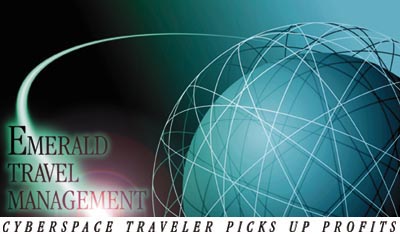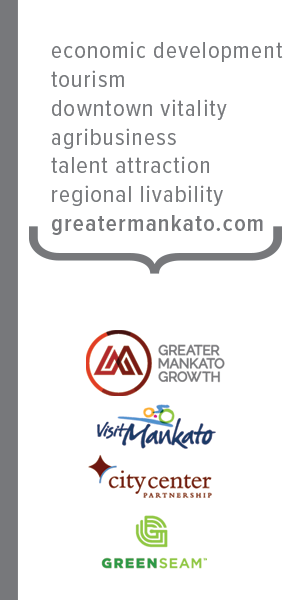Emerald Travel Management
Condensed From Connect Business Magazine.
If you think the Internet is a passing electronic fad, pay attention to the experience of Joe Farnham. Farnham, president of Emerald Travel Management (ETM) in Mankato, put ETM on the Internet last December. (That’s the modern equivalent of putting it “on the map.”) Within a month, new customers from as far away as Georgia and Connecticut began booking flights through ETM. It’s opened corporate doors where he’d never thought of knocking, and it’s put ETM where he wants it to be: “Staying ahead of the curve in this industry.”
It would be gross understatement to say Farnham has increased his base of potential customers. Mankato’s population is 45,000, a diminutive fraction of the 45 million people now “surfing the ‘net.”
While other companies still struggle with the concept of “opening an office” on the Internet (Who’d buy something via a personal computer?), Farnham is close to attaining his goal of “creating a virtual travel agency on the Internet.”
ETM’s offices in Mankato and New Ulm are typical travel agencies. Colorful brochures beg to be plucked from racks. Agents smile. Telephones ring. Clicking keyboards access computers brimming with plane, train, bus and ship schedules and prices. Farnham knows he can put those offices on the Internet. “Everything but the smiles,” he laughed.
ETM’s site in cyberspace is as close as you’ll come to a travel agency without actually walking through the door. Electronic customers can browse travel brochures, set their own itinerary, choose the best price and flight available, pick window or aisle seats, make reservations and pay for the tickets-24 hours a day, 365 days a year. They’ll have but one human contact in the process. After they’ve placed their order, an Emerald agent will call to ask if they want the tickets sent by first-class mail or Federal Express . (Soon, they’ll be able to answer this question electronically, eliminating the call-back.)
By the time you read this, the ever-moving Farnham hopes to add three more enhancements. One will offer you a choice of hotels after you’ve booked your flight, and let you make the reservations. A second will enable you to choose a rental car and reserve it. A third will create a customer profile for you, so the next time you order you won’t have to punch in your personal information again. (Worried about someone siphoning your credit card number? “That profile will be an encrypted, coded file to provide security,” Farnham said.)
There wasn’t much of a stir when Farnham brought the Internet site to the attention of ETM’s present clients. “They said ‘that’s nice,’ but habits are difficult to change. It wasn’t in hope of converting our existing clients that we went on the Web. Nor are our initiatives in technology meant to replace our existing clients. Rather, we’re looking for new markets,” Farnham said. “Existing clients still call our agents. They come in for our expertise. They want to know what we know about this hotel or that one, how close it is to something, and how this cruise line is opposed to that one. And we’re happy to serve these people in ways that are most comfortable to them, because we have a continuing commitment to them.”
But new clients are out there, somewhere in cyberspace, and they’re finding their way to ETM. “A man in Georgia came to our site looking for two discount tickets to Denmark,” Farnham said. ETM filled the order, pleasing the customer who turned out to be CEO of a large technology firm which does business internationally. “We’ll probably have them as a corporate client,” Farnham said, “and we’ve had others come to us and say they were looking for a new travel agency.”
Farnham describes the travel business as a highly competitive, rapidly changing industry. This volatility, plus a financial crunch created when airlines arbitrarily decided to stop paying commissions to travel agents in 1995, led him to putting ATM on the Internet.
“When the airlines took it upon themselves to limit our earning power, we recognized that you can either roll over and die, or you can accept that as a changing part of the industry, adapt to it and move ahead,” he said. (The airlines have since partially restored the commission system, although only TWA is paying the full 10% on all tickets. The others pay 10% on all tickets up to $500, but nothing beyond that so commissions are capped at $50 no matter what expenses the agency experiences.) “The commission on a $1,200 ticket used to cover the expenses on the $189 ticket,” Farnham said. “We still are having to adjust to that loss of revenue.”
The commission turmoil led to a fair amount of introspection. “One has to look out there and say ‘where is this all going?’ One of the answers is that it’s going into the field of technology,” Farnham said. He believes his job as president requires him to “think out ahead of the company.” Wherever he turned, he bumped into the word “Internet.” He found it in the popular press and in trade magazines, where he read about vendors establishing Web sites. “I heard Bill Clinton and Al Gore saying it’s our future,” Farnham recalled. “I saw what was going on around us. Our traditional market proved that it may or may not be with us. I read about companies putting the Internet into their business and booking their own travel. I decided I wanted us to be there.”
©1997 Connect Business Magazine


